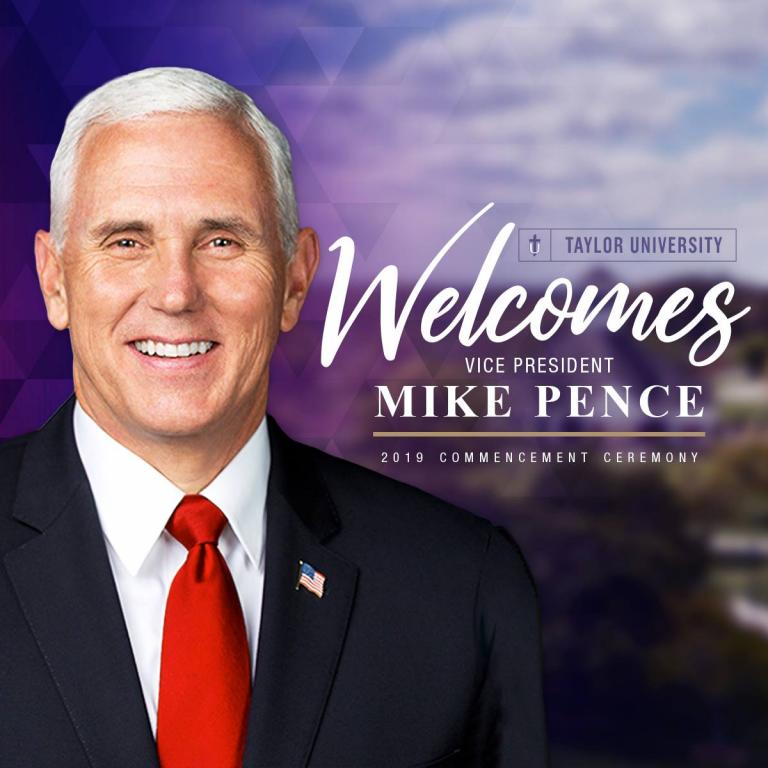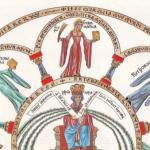On April 11, Taylor University announced that Vice-President Mike Pence would be the speaker at its 2019 commencement. Paul Haines, the university’s president, said, “Mr. Pence has been a good friend to the University over many years, and is a Christian brother whose life and values have exemplified what we strive to instill in our graduates.”
 Dissent came immediately. Alumnus C. Christopher Smith, editor of The Englewood Review of Books, wrote, “Mike Pence’s values are compatible with those of Donald Trump, whose false statements are off-the-charts in comparison to any politician in recent memory, who casually boasts of grabbing women’s genitalia, who has a long and well-documented history of racist behavior, who keeps immigrant children fenced off like animals in a zoo, and so on.” Historian John Fea wrote, “Pence has defended or remained silent about nearly everything Trump has done. Trump has used him as a pawn to win white evangelicals and keep them in the fold.” During an already-scheduled faculty meeting, Taylor’s professors voted 61-49 to oppose the invitation, though they had no authority to actually rescind it.
Dissent came immediately. Alumnus C. Christopher Smith, editor of The Englewood Review of Books, wrote, “Mike Pence’s values are compatible with those of Donald Trump, whose false statements are off-the-charts in comparison to any politician in recent memory, who casually boasts of grabbing women’s genitalia, who has a long and well-documented history of racist behavior, who keeps immigrant children fenced off like animals in a zoo, and so on.” Historian John Fea wrote, “Pence has defended or remained silent about nearly everything Trump has done. Trump has used him as a pawn to win white evangelicals and keep them in the fold.” During an already-scheduled faculty meeting, Taylor’s professors voted 61-49 to oppose the invitation, though they had no authority to actually rescind it.
News coverage emphasized the 61 over the 49. Articles in the Washington Post, Newsweek, and Sojourners seemed to suggest that Haines is an out-of-touch administrator pushing Pence against a unified student body, faculty, and alumni base. As Smith wrote, “As a TU alum, who regularly spends time on the campus talking to faculty and students, I was completely taken aback by this announcement.”
That’s probably because Smith has been hanging out in what one observer has called the evangelical “faculty lounge.” This lounge includes professors at religious universities like Taylor, Calvin, Seattle Pacific, and Westmont, which have long been bastions of an intellectually respectable, cosmopolitan evangelicalism. The lounge also makes room for clergy, missionaries, activists, and educated laypeople who, as Fred Clark describes them, “read Mark Noll’s The Scandal of the Evangelical Mind and nodded along in sad agreement.” Not everyone in the lounge is a moderate or progressive, but many are, and even most who are not have little patience for the politics of Trump and Pence.
Significantly, the visibility of the faculty lounge has made evangelicalism seem less populist than it actually is. Consider the commencement address given at Fuller Theological Seminary nearly fifty years ago by a liberal Republican senator who was becoming an increasingly vocal opponent of the Vietnam War and proponent in favor of environmental legislation. Mark O. Hatfield, nervous about delivering his 1970 address before this conservative evangelical seminary, was deeply encouraged by his reception on campus. One-third of the graduating class, which cheered as he walked into the room, wore black bands on their gowns to signify opposition to the war. Students in a balcony unfurled a banner that read, “Blessed are the peacemakers. We’re with you, Mark.”
The speech that followed, entitled “American Democracy and American Evangelicalism—New Perspectives,” affirmed the demonstrating students, many of whom would soon join the emerging evangelical left. Hatfield began his speech by reading excerpts of his hate mail. His critics, the senator continued, represented “a theological ‘silent majority’ in our land who wrap their Bibles in the American flag; who believe that conservative politics is the necessary by-product of orthodox Christianity; who equate patriotism with the belief in national self-righteousness; and who regard political dissent as a mark of infidelity to the faith.” Fuller’s mandate, Hatfield admonished, was to offer a social and ethical alternative to the “Biblical Nationalists.” Fuller’s leadership in the evangelical world, he said, should revolve around three pressing issues—war, race, and the distribution of wealth—all moral, even spiritual, obligations that could return the movement to the “entirety of the gospel.”
Fuller’s commencement that year seemed transformative for both the senator and the seminary. For Hatfield, the visit was renewing. “There was an inner urge of joy, peace, and strength which I vividly recall to this day. These brothers and sisters were really with me; their acceptance created a sense of spiritual solidarity … It demonstrated to me that there were countless evangelicals, who because of their faith in Christ, could not condone the immoral and barbarian violence our nation was inflicting throughout Indochina.” The surprisingly encouraging response helped reverse his waning desire to remain in politics. It seemed to Hatfield that evangelicalism was heading in a more humane direction.
For the seminary, the Hatfield visit stimulated even more activism. Dozens of Fuller students participated in antiwar protests at the Pasadena post office, and theologians Fred Bush, Jaymes Morgan, and Paul Jewett wrote articles condemning American military intervention. The antiwar faction, led by students Jay Bartow, Randy Roth, and Robert Johnston, wrote a petition expressing “their deep distress over the War in Indochina.” “Our understanding of God’s Word and its bearing on this question,” the statement read, “compels us to speak in support of the Hatfield-McGovern amendment.”
But incidence is not the same as prevalence. The evangelical “silent majority” that Hatfield had described in his commencement address remained more powerful than he and other onlookers might have imagined. If the visit energized an antiwar faction from Fuller’s School of Theology, it also galvanized the School of World Mission, which viewed the war as an opportunity to spread the gospel in Southeast Asia.
And then after Hatfield crossed Nixon and Billy Graham at the 1973 National Prayer Breakfast, the senator’s star in the evangelical world began to diminish. At Wheaton College in early 1974, president Hudson Armerding barred Hatfield from speaking in chapel, relegating him to an auxiliary building. It inflamed high numbers of students and faculty who had been participating in a regular rhythm of anti-ROTC and antiwar protests on Wheaton’s campus. Hatfield’s speech, though it was held at smaller venue, proved to be a resounding success. The student newspaper’s headline read, “He Came; He Spoke; and We Were Conquered.” But Hatfield would not enjoy such resonance again. Dissenters surmised that conservative donors were pressuring Armerding to limit Hatfield’s influence on campus.
In the end, it became clear that Hatfield never represented that much of the evangelical population. To this day there is a silent—and sometimes not-so-silent—majority that outstrips cosmopolitan evangelicalism. They may not win faculty votes, but they’re evident on the school’s Facebook page, where defenders of Pence are rewarded with lots of likes. The following post, written by a Taylor senior, got more than 300 likes in a “conversation” consisting of more than 3,500 comments. The student wrote, “I am very honored to be apart of the 2019 graduating class of Taylor University and am also very honored to have Vice President Mike Pence speak at my commencement ceremony! Thank you to all those working hard to ensure a great day! #tayloru #honored #graduation.”
The most powerful supporters of Trump, of course, don’t bother with Facebook slacktivism. They pick up the phone and call President Haines or write a check. They don’t need to defend their position with words or outrage because they actually hold power to shape decisions. These administrators, trustees, and donors control levers in the background.
Faculty-lounge evangelicals have long tried to overcome their tradition’s populism with a more respectable narrative. In the 1940s Carl Henry and Billy Graham launched the neo-evangelical project in an attempt to clothe fundamentalism in more acceptable garb. From the 1970s onward, the evangelical left, Christianity Today, and former George W. Bush speechwriter Michael Gerson have told inspirational stories of nineteenth-century abolitionists and suffragettes. Many white evangelical leaders now speak of the importance of recovering themes of marginality, pilgrimage, and lament that they say have always pervaded their sacred texts. There is a strong sense among many, especially missionaries, humanitarian workers, pastors, and evangelical professors, that they live in a new global age that requires a missiology of peace and a posture of humility, not a reassertion of Pax Americana. Embarrassed by Trumpism and seeking to cast the movement with respectability, they have sought to define the movement in ever more pure ways.
But abolitionists never really represented the mainstream of evangelicalism. In the nineteenth century, there were always more slaveholders and white Jacksonian patriarchs than Tappan brothers who financed social justice causes. And now in the second decade of the twenty-first century, establishment leaders often seek to define evangelicalism in ways that minimize support for Donald Trump. But it has become clear that they do not speak for the rank and file. There continues to exist a vast populism that upsets faculty-lounge vanities.
That so many have been shocked by persistently high levels of evangelical support for Trump shows just how effective—and misleading—the establishment narration of evangelicalism has been. Taylor’s President Haines appears to know better and has taken to heart the old adage: “Fool me once, shame on you. Fool me twice, shame on me.” As Taylor, like most other Christian colleges these days, struggles financially, Haines is banking on continued sky-high evangelical support for Trump. If the invitation to Pence does indeed translate into more money for Taylor, those dissenting professors can take solace in one thing: they might get to keep their jobs a little longer as higher education crumbles around them.













